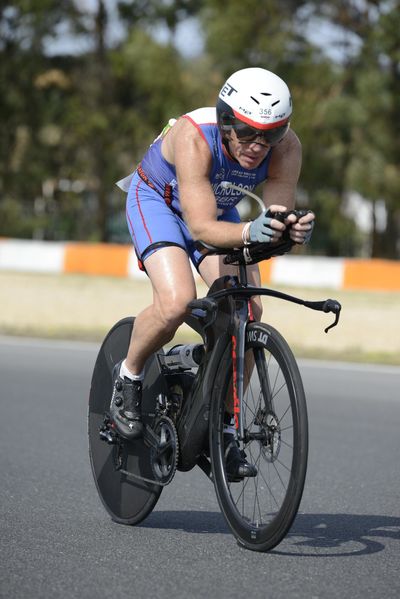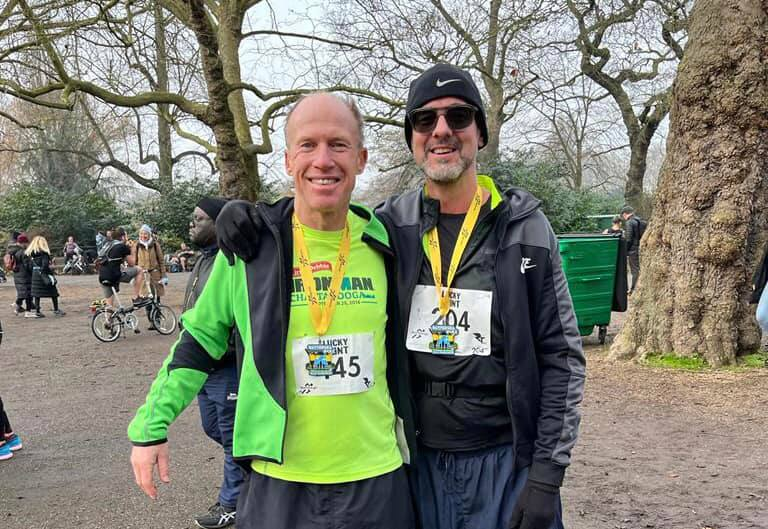When the Economist Intelligence Unit (EIU) looked at businesses’ three-year growth rates, it made a startling discovery. Companies that rated themselves as ‘fast’ recorded 40 per cent higher sales growth and 52 per cent higher income growth than their competitors.
This wasn’t a scientific measure, it was simply: “How do you rate your speed of execution?” The EIU study concluded: “When executives viewed their company as achieving strategic speed, their perceptions were a good predictor of actual strong business performance.”
As a triathlete who spends a lot of time figuring out how to go faster, I’m fascinated with the effect of psychology of speed. Can we think ourselves faster?
I believe it really is possible. For example, why is it that – when the finish line comes into view – our bodies mysteriously stop hurting and we can run much faster? Why does an orange coloured drink give us a greater energy boost than a clear one? (Answer: because our brains think it must contain sugar, producing a physical reaction).
Speed is now one of the key components of business success. Amazon has revolutionised retail through shrinking delivery times; online banking means that transfers are virtually instant; and in recruitment, clients can interview candidates minutes after getting their CVs.
Anyone who says it takes days to deliver, that it takes a month to settle an invoice, or needs weeks to present candidates for a vacancy will find competitors eating their lunch.
As Vincenzo Trabacca at Antal International in Italy points out: “Speeding up recruitment is our biggest challenge. We use technology to interview candidates and it’s helped us massively. It’s reduced the time to find people from one week to one day.” Trabacca’s office recorded a 300 per cent increase in revenue in 2021, much of it thanks to working faster.
In preparation for the Ironman World Championships in May this year, I focused on five areas to improve my speed:
Beneficial repetition

Every Wednesday, I ran up and down a steep hill in my local park, eight, 12, 16, even 20 times. After three months, I was running faster up that hill than my 29-year-old son. Every Sunday, I’d ride 50, 60 or 100 miles up the hills of Kent or Essex, practicing staying in the aero position. Every week I’d swim 10,000 meters in the local pool, repeating the same sessions, week after week, my speed improving little by little.
In business, doing the same thing repeatedly, but doing it a bit better and quicker every time, yields results. It’s an important mindset: you’re not restricted by your current performance, you can always improve, always get quicker.
Harness technology

Just as Antal International has employed online interviews to speed up its recruitment process, athletes today record every training session and study the results. I pay close attention to heart rate and weight, watts generated on the bike, elevation climbed on bike and run, the cadence of my legs when running and cycling and arms when swimming. Then, finally the speed of each swim, bike and run.
After each session, I think about what contributed to my speed this time. Was it the good night’s sleep I had last night? Was it the effect of yesterday’s sessions? Was it something my coach said? How could I do things differently next time, to improve my speed even more?
I think this constant reflection works well in business. Speed doesn’t just come by magic, it’s a process achieved through combining a hundred elements, focused on an overall objective.
Set a deadline
The beauty and fearsome threat of a sports event like the Ironman World Championship is that there’s no escape from time. It began at 06.50 on Saturday 7 May 2022 in the freezing waters of Sand Hollow reservoir in Utah. I’d paid more than $1,000 as a race entry, thousands more in travel and accommodation and nine years competing in more than 43 triathlons to get to this point. My focus on maximising speed was intense and unwavering.
For businesses, it can seem like deadlines merge into a steady stream, rather than provide a sharp focus. But time-sensitive cut-offs like the end of the tax year, the start of the holiday season or the renewal of a major contract can act as motivator. By adopting the psychology of an athlete, who must perform at their absolute peak on a given day, you can psyche yourself up to deliver outstanding results at speed when called upon.
Faster performance is self-perpetuating. As the saying goes: if you want something done, ask a busy person.
Think of the competition

As a triathlete, I’m always energised by the competition: I swim, bike and run much faster when surrounded by others. But this speed has to be managed: if I simply chase after faster athletes, I’ll burn out and slow down (or ‘bonk’, as we say in endurance sport). The key is to balance the adrenalin and motivation of competition with the sobriety and calm of ‘running your own race’. Don’t be disheartened when people overtake you; do be inspired to go faster. It’s a glass half full approach.
At Antal International, COO Sagar Ruparelia had to take a series of quick decisions when the pandemic hit in 2020, furloughing dozens of staff and putting others on shorter working weeks. “Because all the other recruiters were in the same boat, it made our decisions easier,” says Ruparelia. “It also meant that, when conditions improved, we were able to respond quickly, as clients hired at a fast pace.”
Antal emerged from the pandemic in better shape than many of its competitors, having acted quickly and decisively to unforeseen events and remained ready to expand again.
Optimise yourself

Triathlon is a freaky sport, because the conditions dictate so much about the speed. In Ironman racing, the water conditions, the height of the hills, the changing weather over eight or more hours can throw everyone off their times. In my case, I’m an average swimmer who needs to conserve their energy for later, a strong cyclist - I made up more than 100 places during the World Championship bike leg - and a solid runner capable of a 20-minute 5,000m. Putting these together to optimise each component is the work of a lifetime. Too much speed on the bike can spell disaster on the run.
In business, this means recognising your distinct place in your sector: addressing your specific market and acting quickly when you spot an opportunity to gain competitive advantage. It means training consistently to metaphorically outswim/bike/run the competition.
The more you think like this, the faster you’ll be. Outperformance will follow.
David Nicholson runs www.freelancejournalist.co.uk – providing journalism to publications and companies. Contact David at [email protected] or mobile 07802 834477.
Anthony Goodwin is the founder and CEO of Antal International – www.antal.com – with more than 800 people in 35 countries.
Recent Posts
- Why 2026 Will Be the Year of “Selective Careers,” Not Job Hopping By Antal International
- What FCA Scrutiny Is Doing to Hiring Decisions in UK Banks By Imo Etuk
- January Reset: What the First Days of 2026 Reveal About the Job Market By Antal International
- Why UK Banks Struggle to Hire Heads of Compliance and MLROs By Imo Etuk

